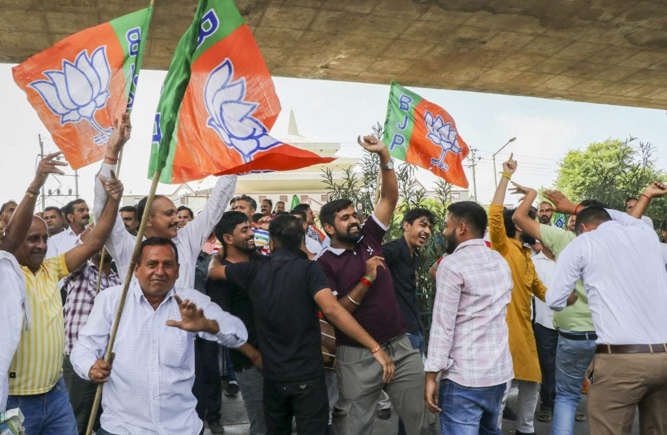The highly anticipated Jammu and Kashmir elections in 2024 culminated in a dramatic and closely watched outcome, marking a significant moment in the political landscape of the region. As the final tally of the results came in, the Bharatiya Janata Party (BJP) secured 29 seats, while the alliance of the National Conference (NC) and Congress emerged as the dominant force, leading the way with a considerable number of seats. This election, held after years of political uncertainty and against the backdrop of unique historical challenges, has set the tone for the future of the Union Territory.
The Political Context
Jammu and Kashmir has been in the spotlight since the abrogation of Article 370 in 2019, which stripped the erstwhile state of its special status and bifurcated it into two Union Territories — Jammu and Kashmir, and Ladakh. The 2024 election is the first major election since the region was reorganized, and political stakeholders have been working to re-establish their foothold in this new era.
The elections were held for 90 seats in the Jammu and Kashmir Legislative Assembly, with multiple parties contesting for power. The BJP, which has maintained a strong presence in the Jammu region, focused its campaign on issues of national integration, security, and development. On the other hand, the NC-Congress alliance, which commanded considerable influence in the Kashmir Valley, centered its platform around restoring political rights, preserving regional identity, and safeguarding the interests of the people in this sensitive region.
BJP’s Performance: A Strong Hold in Jammu
The Bharatiya Janata Party’s victory in 29 seats underscores its dominance in the Jammu region, where it has consistently enjoyed support due to its nationalist agenda and promises of economic development. Jammu, known for its pro-BJP sentiments, once again proved to be the party’s stronghold, with voters responding positively to its focus on infrastructure development, employment opportunities, and security concerns.
The BJP’s top leaders, including Prime Minister Narendra Modi and Home Minister Amit Shah, made frequent visits to Jammu to rally support during the election campaign. They reiterated the government’s decision to revoke Article 370, which was seen as a historic step toward integrating Jammu and Kashmir fully with India. This narrative resonated well in the Jammu region, which has largely supported such moves for greater central control and security measures.
However, despite the BJP’s strong showing in Jammu, it failed to make significant inroads in the Kashmir Valley, where the electorate leaned heavily toward regional parties that advocated for the restoration of political autonomy and rights that were lost in the aftermath of the 2019 changes.
NC-Congress Alliance: The Undisputed Leader in Kashmir
The alliance of the National Conference (NC) and Congress emerged as the primary force in the Kashmir Valley, capturing the majority of the seats and leading the election overall. With veteran politician Farooq Abdullah leading the National Conference, the alliance focused on addressing local grievances, the demand for restoring statehood, and safeguarding the cultural and political identity of Kashmiris.
Farooq Abdullah and Congress leaders such as Rahul Gandhi emphasized the need to restore trust between the people of Jammu and Kashmir and the Indian government, which they argued had been fractured by the unilateral abrogation of Article 370. Their campaign promised to push for a return to statehood, greater political representation, and economic stability, which resonated deeply with the voters in the Valley.
This alliance’s ability to consolidate votes from across the region, particularly from rural areas and traditional strongholds, ensured their dominance in the electoral battle. Out of the total seats, the NC-Congress alliance secured a commanding number, placing them in a strong position to form the government.
Future Challenges and Opportunities
While the BJP’s victory in Jammu is a significant win for the party, the NC-Congress alliance’s lead in the overall tally is a clear reflection of the regional divide in Jammu and Kashmir politics. The Valley’s voters have shown a preference for regional parties that can address their unique challenges and aspirations, while Jammu remains aligned with the BJP’s nationalistic and development-centric agenda.
The results point to the need for greater dialogue between the central government and regional leaders, especially as the newly formed government will need to balance the interests of both Jammu and Kashmir regions. The NC-Congress alliance has already indicated that it will push for the restoration of statehood, and how the BJP, with its strong presence in Jammu and at the national level, responds to these demands will shape the political discourse in the years to come.
The 2024 Jammu and Kashmir elections have set the stage for a new era in the region’s political history. The BJP’s success in Jammu and the dominance of the NC-Congress alliance in Kashmir reflect the complex and divergent political aspirations of the two regions. As the dust settles, the focus will shift toward governance, with both national and regional players working to address the aspirations of the people in this strategically and politically crucial Union Territory.
